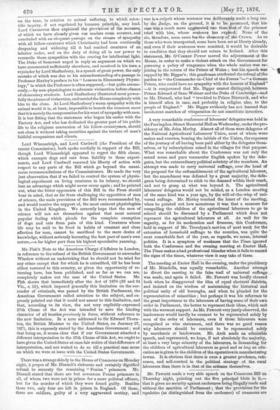There was a strange shindy in the House of Commons
on Monday night, a propos of Mr. Disraeli's elaborate and certainly dignified refusal to amnesty the remaining " Fenian " prisoners. Mr. Disraeli stated that there are but seventeen Fenian prisoners in all, of whom two were not in prison for a mere political offence, but for the murder of which they were found guilty. Besides these two, only four are left in prison in England. Of these, three are soldiers, guilty of a very aggravated mutiny, and one is a culprit whose sentence was deliberately made a long one by the Judge, on the ground, it is to be presumed, that his case was a much more aggravated one than that of the prisoner tried with him, whose sentence has expired. None of the six, therefore, seem cases for the clemency of the Crown. As to those who were transported, some have been set at liberty already, and even if their sentences were remitted, it would be desirable to condition that they should not return to Ireland. After this statement, Mr. O'Connor Power moved the adjournment of the House, in order to make a violent attack on the Government for pursuing a policy of vengeance when the whole nation was re- joicing in the return of the Prince of Wales ; but his speech was capped by Mr. Biggar's ; this gentleman attributed the refusal of the pardon to "the Commander-in-Chief of the Forces "—"a German Prince, who could have no sympathy with the honour of England" —it is conjectured that Mr. Biggar cannot distinguish between Prince Edward of Saxe-Weimar and the Duke of Cambridge--ancl. to Mr. Disraeli, who had "truckled to Prince Bismarck, and who is himself alien in race, and probably in religion also, to the people of England." Mr. Biggar evidently has not learned that incoherent snatches of vituperation do not constitute invective.






























 Previous page
Previous page